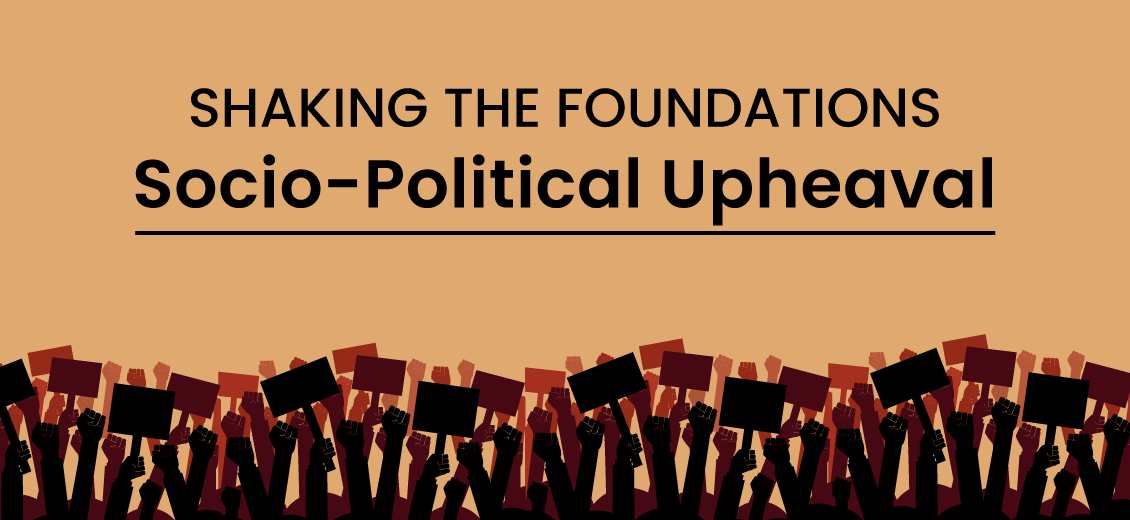Shaking the Foundations: Socio-Political Upheaval
Blogs Home
- 08 Aug 2023

Socio-political upheaval refers to a condition of significant and often tumultuous social and political change within a society or nation. During such periods, there are widespread disruptions in the established social order, political structures, and cultural norms, often leading to a shift in power dynamics, ideologies, and social values. It's important to note that the significance of socio-political upheavals can vary depending on the context, historical background, and specific circumstances of each nation or society. Some upheavals may lead to positive transformations and progress, while others can result in prolonged periods of instability and adversity. Understanding the causes, consequences, and implications of these upheavals is crucial for policymakers, historians, and individuals seeking to shape the future of their societies and nations.
Major Socio-Political Upheavals and their Impacts
History is filled with numerous other instances of socio-political upheavals that have shaped the course of nations and societies worldwide. Some of the major upheavals are:
French Revolution
The French Revolution was a period of radical social and political change in France that led to the overthrow of the monarchy, the rise of Napoleon Bonaparte, and the establishment of the First French Republic. The revolution was fuelled by growing inequality, economic crisis, and dissatisfaction with the absolute monarchy. Western Europe underwent a significant political transition during the decades of economic and social revolution. The French Revolution (1789–99) and its aftermath served as the main event for a large portion of the Continent. A focused effort at political retaliation and a new wave of uprisings from 1820 to 1848 came after it. Real but intricate links existed between political transition and socioeconomic turmoil.
Russian Revolution
The Russian Revolution (1917) marked the end of the Romanov dynasty and the rise of the Bolsheviks, led by Vladimir Lenin. It resulted in the establishment of the world's first communist state, the Soviet Union. The revolution was driven by deep-rooted social inequality, widespread poverty, and opposition to the autocratic rule of Tsar Nicholas II.
Chinese Revolution
The Chinese Revolution (1949) culminated in the victory of the Chinese Communist Party under the leadership of Mao Zedong. The revolution resulted in the establishment of the People's Republic of China, ending the rule of the Nationalist government led by Chiang Kai-shek. The revolution was driven by a desire for social and economic reforms and an end to foreign domination.
Cuban Revolution
The Cuban Revolution (1953-1959) led by Fidel Castro and Che Guevara overthrew the authoritarian government of Fulgencio Batista. The revolution aimed to end corruption, inequality, and foreign influence, and resulted in the establishment of a socialist government in Cuba.
Iranian Revolution
The Iranian Revolution (1979) led to the overthrow of the monarchy and the establishment of the Islamic Republic of Iran under Ayatollah Ruhollah Khomeini. The revolution was a response to widespread discontent with the rule of Mohammad Reza Pahlavi, known as the Shah, and the desire for Islamic governance.
Velvet Revolution
The Velvet Revolution (1989) was a non-violent uprising in Czechoslovakia that led to the end of communist rule and the establishment of a democratic government. The revolution was sparked by opposition to the one-party communist regime and a desire for political and economic reform.
Arab Spring
The Arab Spring (2010-2012) was a series of uprisings and protests across several Arab countries, including Tunisia, Egypt, Libya, Yemen, Syria, and others. The movement aimed to challenge authoritarian rule, corruption, and socio-economic issues. While the outcomes varied across different countries, it led to significant political changes and upheavals in the region.
Indian Independence Movement
The Indian independence movement (1857-1947) was indeed a socio-political upheaval. It was a massive and transformative movement that spanned several decades and involved various social, political, and cultural aspects. The movement aimed at ending British colonial rule and gaining independence for India. The Indian independence movement culminated in the achievement of India's independence on August 15, 1947. The movement's success marked a turning point in world history and served as an inspiration for many other anti-colonial struggles across the globe.
Causes of Socio-Political Upheaval
Socio-political upheavals are major disturbances or disruptions that occur within a society or a country due to various factors. These upheavals often involve significant changes in social, political, and economic structures and can lead to protests, revolutions, or even civil wars. Some of the common causes of socio-political upheaval include:
- Economic Inequality
- Political Repression
- Corruption
- Ethnic, Religious, or Cultural Tensions
- Lack of Basic Services and Opportunities
- Political and Economic Instability
- Unresolved Historical Grievances
It's important to note that these causes can often interact and reinforce each other, leading to complex and multifaceted socio-political upheavals. Each situation is unique and can be influenced by a combination of factors specific to the country or region experiencing the upheaval.
Impacts of Socio-Political Upheaval on Society and Culture
The impacts of socio-political upheaval on society and culture are far-reaching and complex. When significant disruptions occur in the political and social fabric of a nation or a community, various aspects of life are affected, leading to both positive and negative consequences. While some changes may be positive, such as cultural revitalization and social mobilization for change, upheavals also bring challenges and disruptions that can take years or even generations to resolve. Understanding these impacts is crucial for addressing the consequences and working toward sustainable recovery and growth. Some of the common impacts of socio-political upheaval on society and culture are Displacement and Migration, Cultural Erosion and Revival, Changes in Values and Beliefs, Economic Disruptions, Institutional Changes, Trauma and Mental Health issues, etc.
Global and Regional Implications
Covid-19 is primarily a public health crisis that has had significant socio-political implications. While the virus itself is a biological phenomenon, its impact on societies and governments worldwide has led to various socio-political upheavals. Its broader ramifications have indeed triggered socio-political upheavals by highlighting existing vulnerabilities, challenging governance systems, and prompting discussions about various societal issues. The extent and nature of these upheavals vary by region and context, but they collectively illustrate the interconnectedness of health, society, and politics.
In September 2022, the United Nations Development Programme (UNDP) released its Human Development Report (HDR) with the title "Uncertain Times, Unsettled Lives: Shaping Our Future in a Transforming World”. This study reaches the predictable finding that, while returning to its 2016 levels, the Human Development Index (HDI) has decreased globally for approximately 90% of the nations ranked. In other words, any initiatives to advance or even expedite the realization of the 2030 Agenda (SDGs) have been severely threatened.
Challenges and Opportunities
Socio-political upheavals are complex phenomena with both challenges and opportunities. While they can lead to instability and human suffering, they can also drive positive change, promoting democracy, social justice, and progressive reforms. How these challenges are navigated, and opportunities are embraced largely depends on the responses of governments, civil society, and citizens during and after the period of upheaval. Violence and instability, economic disruptions, political polarization, and human rights violations are some major challenges related to socio-political upheavals. On the other hand, democratic reforms, social justice and equality, civil society empowerment, technological advancements, and International Solidarity are some main opportunities associated with Socio-political upheavals.
Lessons for the Future
Extracting lessons from past upheavals is essential for informing future policies and strategies in handling social and political tensions. History is a valuable teacher, offering insights into the consequences of various approaches and actions. By studying past events, we can identify patterns, understand root causes, and adopt more effective solutions.
Many social and political tensions arise from underlying issues such as inequality, discrimination, economic disparities, and cultural divides. To effectively handle these tensions, policies, and strategies must address the root causes rather than merely treating the symptoms. Open and constructive dialogue between different groups is crucial for finding common ground and preventing conflicts. Leaders and policymakers should strive to understand the perspectives of various communities to develop policies that consider the needs of all. Short-term fixes may provide temporary relief, but long-term solutions are necessary to address deep-rooted tensions.
Societies are dynamic and tensions can arise from unexpected sources. Policymakers must be flexible and adaptable to changing circumstances and emerging challenges. Ensuring diverse and inclusive representation in decision-making processes can lead to more comprehensive and equitable policies. The past has shown that marginalized groups are often the most affected by upheavals, so involving them in policymaking can help prevent tensions from escalating. Education also plays a critical role in shaping attitudes, breaking stereotypes, and promoting tolerance. By investing in quality education, societies can foster a more informed and understanding citizenry.
Conclusion
Socio-political upheavals can be catalysts for positive change, leading to improved rights, freedoms, and social justice. However, they can also be sources of instability and conflict, especially when existing power structures resist change or when multiple factions with different ideologies clash. Understanding the causes and consequences of these upheavals is essential for addressing social challenges and building a more equitable and inclusive society.
Sources
https://www.britannica.com/topic/history-of-Europe/Romanticism-and-Realism
https://hdr.undp.org/content/human-development-report-2021-22
Arifa Nadeem

Arifa Nadeem is from Jhansi, UP. She has qualified for UGC NET in Tourism Administration & Management and is currently pursuing her Ph.D. in Tourism from Bundelkhand University, Jhansi.
Blogs Home



